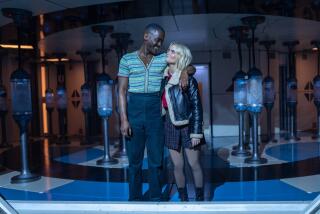‘Doctor Who’ meets James Bond in the swashbuckling ‘Spyfall’
- Share via
It was likely mere coincidence that the BBC premiered “Doctor Who” just a year after the arrival of the first James Bond film, the similarly titled “Dr. No,” released in 1962. But each series went on to create one of the United Kingdom’s great, global icons of world-saving heroism — which in the case of “Doctor Who” extends to saving the galaxy, the universe and reality itself.
Those cultural worlds collide Wednesday on BBC America in the Season 12 premiere of the revived series — there was a long hiatus, from 1989 to 2005 — which does double duty as a New Year’s Day special. Titled “Spyfall,” in an obvious echo of the 2012 Bond entry “Skyfall,” it comes with School of John Barry music cues, exotic locations, black-tie formal wear, casino gambling, cases full of gadgets, a chase scene, a tech billionaire villain (Lenny Henry), a “Bond, James Bond” joke and Stephen Fry as M16 head “C.” (I don’t know if there’s a reference I’m missing in that “C”; maybe it stands for Chris Chibnall, the current showrunner.) Spies of many nations are being attacked, in ways that defy terrestrial science and tradecraft.
Like Bond, the Doctor has been played by many actors over the years — the character periodically “regenerates” into a new, yet dramatically identical, person — and is currently played by a woman, Jodie Whittaker, starting her second season. (The possibility of a female Bond, or at least a 007, has been in the air as well.)
That the Doctor might at last be played by someone other than a white male seemed likely from the moment previous Doctor Peter Capaldi announced his retirement from the role in 2017 — Phoebe Waller-Bridge, Olivia Colman and Idris Elba were among the names oddsmakers threw around. (That it turned out to be Whittaker, who had costarred in Chibnall’s “Broadchurch,” was a surprise.) Some hidebound fans refused to imagine that a character defined by physical alteration, in a series that does not fret much over canonical consistency, could change into a woman. But viewership is on par with preceding seasons, and Whittaker owns the character as surely as any of her predecessors, bringing the requisite reckless curiosity and physical bravery and adding a screwball exuberance all her own. (“I made ice tea — possibly.”) When Fry’s spy chief meets the Doctor, he initially addresses himself to the white male on her team. “I’ve had an upgrade,” Whittaker replies, setting him straight.
(Whatever shape the Doctor takes, the character will always be some sort of British; Whittaker’s 13th Doctor speaks with a Sheffield accent.)
Chibnall’s first season, which was also Whittaker’s, had its greater and lesser episodes — nothing yet to match the best of Russell T. Davies, who revived the series in 2005, or Stephen Moffat, who succeeded him as head writer, but with some solid ideas and memorable moments. It took some time to find its feet, but it was no disaster. And “Spyfall” — a two-part episode that concludes Sunday, when the show takes up its regular time slot — comes on strong. It’s been a solid year since last we saw the Doctor and her friends, and there is a “Did you miss us?” giddiness to their return. It’s fun, often funny and action-packed, which is not to say things don’t get a little heavy by the first hour’s cliffhanger end.

Intense, sometimes quasi-romantic bonding between the Doctor, who flits about in space and time, and a traveling companion has been a distinguishing feature of the 21st century series. Like William Hartnell’s First Doctor, back in 1963, however, Whittaker travels not with a companion but a company, a “fam” to use her own word: young Yasmin (Mandip Gill), young Ryan (Tosin Cole) and not-young Graham (Bradley Walsh), Ryan’s stepgrandfather. They have issues with one another but the Doctor is above the fray. Capaldi’s Doctor carried a lot of baggage; Whittaker’s is a new woman, tough but not angry nor, like some of her predecessors, weighed down by her considerable history. Relatively speaking, she floats free.
Perhaps the only completely consistent point throughout the series — in this century anyway — is that the Doctor is a person who needs people, which is why the show works best as pure swashbuckling adventure, as in most of “Spyfall,” or when it revels in the emotional connections between characters, their partings and reunions, and moments of mutual understanding. It does less well when it tries too hard to tell you something Very Important, or gets overly interested in the Doctor’s traumatic psychology. “Hate is always foolish, and love is always wise,” said Capaldi’s Doctor, leaving a message for Whittaker’s — good advice, and “Doctor Who” in a nutshell.
More to Read
The complete guide to home viewing
Get Screen Gab for everything about the TV shows and streaming movies everyone’s talking about.
You may occasionally receive promotional content from the Los Angeles Times.







